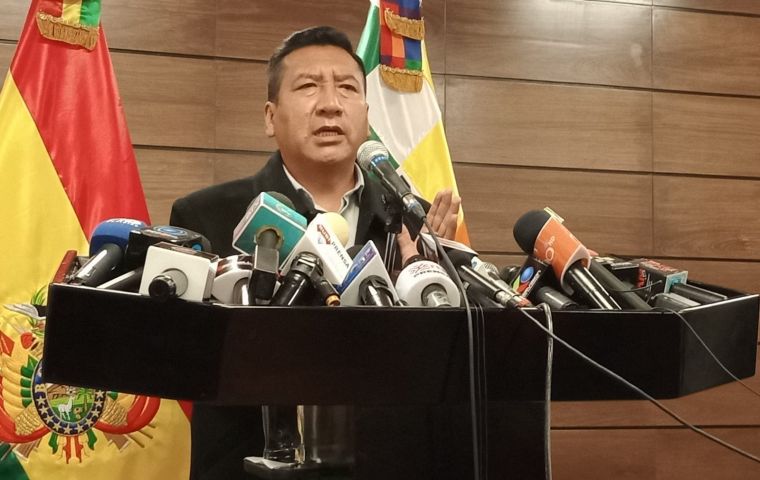MercoPress. South Atlantic News Agency
Unvaccinated Bolivian VP does not intend to take the treatment
 How will Choquehuanca go to work next year when a vaccination card is required to access indoor offices?
How will Choquehuanca go to work next year when a vaccination card is required to access indoor offices? Bolivia's Vice President David Choquehuanca has not taken any COVID-19 vaccine and said he did not intend to either, it was reported Thursday.
Choquehuanca spent quite a while Wednesday at an indoor venue without wearing a face mask in a room where some 500 people were believed to have gathered.
After that, Deputy Alberto Astorga, from Comunidad Ciudadana, sent a letter to Choquehuanca demanding him to be vaccinated against COVID-19. “We also ask you to provide us with the necessary proof that you have been vaccinated,” he said in the letter, according to El Deber.
The lawmaker pointed out that despite “the shortcomings of the vaccination plan implemented by the government, a part of the population is already receiving the third dose of the vaccine, and we understand that you do not even have the first. It seems irresponsible on your part, since not only do you run the risk of being infected, you also put citizens at risk.“
Astorga also pointed out Decree 4641 becomes effective Jan. 1 demanding proof of vaccination to enter public spaces. The Congressman also asked the Vice President ”to encourage the population to be vaccinated, for the good of public health, it is important that we, the authorities elected by the citizen vote of the different State Bodies, act by example at all times and even more so when infections increase in the country.”
Pressure against Choquehuanca is said to be also stemming from his own Movement Toward Socialism (MAS) party. Union leader Juan Carlos Huarachi of the Central Obrera Boliviana (COB) also asked Choquehuanca to be immunized, as did Deputy Héctor Arce, a figure close to former President Evo Morales.
In the meantime, groups opposing mandatory vaccination have marched this week through the streets of La Paz, Cochabamba and Santa Cruz.
According to El Deber, one of those groups Tuesday approached a vaccination point at El Alto and threatened to destroy doses, while attacking health care staff.
Other groups convened at the main squares of Santa Cruz and Cochabamba. In the capital of Santa Cruz, a doctor said vaccination increased the effects of the disease. “The purpose of the vaccine is to prevent deaths, but we still have to use chinstraps and alcohol. What is the purpose of immunizing you if you still have to take care of yourself?,” he wondered.
At Cochabamba's 14 de Septiembre square, people mobilized against the vaccination card and demanded that, if the measure was to go on, tests should bear no cost on people.
Currently there are 47,150 active cases and the accumulated number of recovered patients is 524,973. The fatality rate in this fourth wave, which began in October, is 0.9%, according to health authorities.
Regarding vaccination, a nationwide report detailed that so far 4,582,835 people over 18 years of age have received the first dose of vaccine, another 3,583,655 the second and 983,511 others had taken single-dose drugs. In addition to that, 532,873 people over 18 years of age and those with underlying medical conditions have received a third dose.
According to the report, 510,331 adolescents from 12 to 17 years old received first doses and 311,611 the second, while 195,926 children from 5 to 11 years old have been immunized with first doses.
Immunization began in Bolivia at the end of January in stages to include, starting this month, minors between the ages of 5 and 11, with an estimated “vaccinable” population of about 10.2 million people.
The vaccination card requirement has led to long lines at immunization points in Bolivian cities. In some of them, municipal authorities decided to suspend the end-of-year festivities.
In Santa Cruz, health authorities have warned that the “worst epidemiological storm” was underway, despite which people go en masse for tests to confirm or rule out a possible contagion.
The national government has assured that the Omicron variant has not yet been detected in the country and that due to suspicions of cases with this or another of the new variations, permanent epidemiological surveillance was being carried out.




Top Comments
Disclaimer & comment rulesCommenting for this story is now closed.
If you have a Facebook account, become a fan and comment on our Facebook Page!